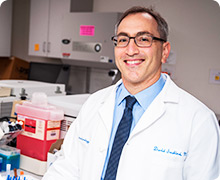Inflammatory Bowel Disease – Dietary Modifications
Effect of dietary modifications on disease activity
Technology Overview
Inflammatory bowel disease (IBD) is an immune dysregulation triggered by the fecal microbiome. Patients suffer from diarrhea, blood in stool and abdominal pain, as well as nutritional and growth defects. IBD, along with other immune dysregulations such as multiple sclerosis, diabetes mellitus and juvenile idiopathic arthritis, is a disease of the 20th century, with notable increase in incidence in the last half century. Current therapies have focused on suppressing the immune system. These immunosuppressive therapies are not effective for all patients and carry significant side effects and costs. The goal of Dr. David Suskind’s work is to establish therapies for inflammatory bowel disease through manipulation of the fecal microbiome.

Dr. David Suskind
Changing the fecal microbiome through dietary therapy is a major focus of Suskind’s lab. An initial study on the Specific Carbohydrate Diet (SCD) in IBD revealed that diet not only resolved patients’ clinical symptoms but also decreased the inflammation associated with their disease. His research has led to the first prospective study of SCD in IBD examining the effect of diet on clinical and laboratory disease activity, as well as assessing the diet’s effect on the fecal microbiome and its associated metabolomics. Suskind’s current study is examining three different anti-inflammatory diets in a double-blind diet-controlled trial in patients with Crohn’s disease. His hope is to better define the optimal diet for patients with IBD. In addition to Suskind’s research in diet and nutrition, he currently has an active clinical practice in pediatric IBD with an active nutrition program. Seattle Children’s Pediatric IBD Center currently follows over 800 children with Crohn’s or ulcerative colitis.
Stage of Development
- Clinical trial
Partnering Opportunities
- Collaborative research opportunity
- Sponsored research agreement
- Consultation agreement
- Sample access
Publications
- Suskind, DL, Brittnacher M, Wahbeh G, Shaffer ML, Hayden HS, Singh N, Damman CJ, Hager K, Nielson H, Miller SI. Fecal Microbial Transplant Effect on Clinical Outcomes and Fecal Microbiome in Active Crohn’s Disease. Inflamm Bowel Dis. 2015 Mar; 21(3):556-66 PMID:25647155.
- Suskind DL, Wahbeh G, Gregory N, Vendettuoli H, Christie D. Nutritional Therapy in Pediatric Crohn’s Disease: The Specific Carbohydrate Diet. J Pediatric Gastroenterol Nutr. 2013 Sep 16; PMID:24048168.
- Suskind DL, Cohen SA, Brittnacher MJ, Wahbeh G, Lee D, Shaffer ML, Braly K, Hayden HS, Klein J, Gold B, Giefer M, Stallworth A, Miller SI. Clinical and Fecal Microbial Changes With Diet Therapy in Active Inflammatory Bowel Disease. J Clin Gastroenterol. 2016 [Epub ahead of print]
- Lane ER, Zisman TL, Suskind DL. The Microbiota in Inflammatory Bowel Disease: Current and Therapeutic Insights. J Inflamm Res. 2017; 10:63-73.
- Suskind, DL. Nutrition in Balance (NIMBAL) Therapy: Using Diet to Treat Inflammatory Bowel Disease. NIMBAL Publishing, 2016.
Learn More
To learn more about partnering with Seattle Children’s Research Institute on this or other projects, email the Office of Science-Industry Partnerships.